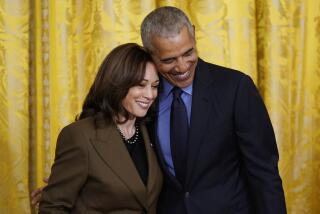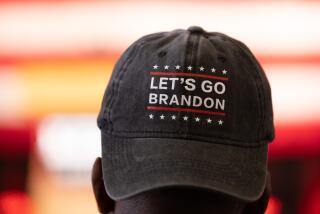Bradley, McCain Take Two Different Paths on Journey to Political Reform
RAYMOND, N.H. — Asked last fall about his political role models, Bill Bradley started with Woodrow Wilson and Jimmy Carter. Asked a similar question here last Saturday, John McCain named Theodore Roosevelt and Winston Churchill.
As much as any poll, those answers explain why Bradley has trailed Vice President Al Gore in tomorrow’s New Hampshire primary, while McCain is still standing toe-to-toe against George W. Bush. Bradley and McCain share some common passions (primarily campaign finance reform). But those answers reveal McCain as a man much more comfortable with the bare-knuckled politics it will take to survive tomorrow’s crucible--and to thrive in the White House if he ever gets there.
“The moral of the story,” says Mike Murphy, McCain’s chief strategist, “is if you want to run a reform campaign, go with the fighter pilot.”
Bradley’s heroes were idealists and dreamers whose ideals ultimately cracked against the reefs of political realities they considered unseemly. McCain’s heroes were fighters who reveled in combat, political and otherwise. A few years ago, historian John Milton Cooper wrote an insightful book in which he memorably described Theodore Roosevelt and Woodrow Wilson as “The Warrior and the Priest.” It’s not a bad description for McCain and Bradley, either.
Over the last 100 years, most political reformers, like Bradley and Wilson, have fit the mold of the priest. In the political world, the rap on the priests is that they crumble under pressure.
At their best, the priests give uplifting speeches that open the door to new possibilities. But they have a reputation for slipping away when the punches start flying--on the campaign trail or in legislative combat. Years later, the priests resurface with wry and erudite memoirs that bemoan the griminess--the sweat and self-interest--of a political world that could not recognize their goodness. They get photographed in a sweater on the back jacket, maybe in a peaceful grove of aspens, and receive favorable notices in the New York Review of Books.
Reformers with a touch of the warrior are a much rarer breed: Teddy Roosevelt, arguably Franklin D. Roosevelt, maybe Bobby Kennedy. They are idealists without illusions. They don’t wait for their opponents to recognize the virtue of their positions; they scheme, fight, scratch and claw to advance their ideas. The priests always seem to dip their toe into politics, as though worried about catching a rash; to the warriors, politics is a noble calling, the way a cacophonous society equitably settles its differences.
As if genetically programmed, Bradley and McCain have upheld these archetypes to a T in this campaign. Bradley, the priest, has mostly treated the race as a cross between an academic seminar and a motivational lecture: He invites voters to imagine they are good enough to join him. McCain, the warrior, has viewed the campaign as closer to war, where the imperative is to gain, and hold, ground.
Even when they strike similar themes--pledging to sweep away the influence of special interests--the distinctions are vivid. On stage, McCain is as coiled as Bradley is languid. Listeners sometimes have to cup their ears to hear Bradley; McCain fires out his words in martial bursts underscored by short, sharp jabs with his arms. When Bradley talks about reform, he projects a yearning for a better world; McCain bristles with outrage at the imperfections of this one.
Priests spend more time cracking the books, and Rhodes Scholar Bradley can talk about domestic policy with far greater mastery than Naval Academy cut-up McCain (whose answer to a distressing number of subjects is a promise to convene “the best minds in the country” once he is president). But McCain exudes a level of force and command utterly absent in Bradley’s musings about “a world of new possibilities, guided by goodness.” On Saturday, McCain sounded like Clint Eastwood, barking “make my day” when he promised as president to expose members of Congress who pad the budget with pork-barrel spending: “I’ll make ‘em famous,” he snarled, not once, but twice.
In the last days before the vote here, Bradley has finally thrown away his seminar book--or, more precisely, he’s thrown it at Gore. But even now, as Bradley steps down from the pew, he’s responded in a way that is subtly, but revealingly, different from McCain’s reaction to similar challenges.
From the first moments that Bush attacked McCain’s campaign finance and tax plans in December, the Arizona senator has defended his own ideas and directly attacked Bush’s competing proposals on their merits. For weeks, Bradley didn’t even deign to directly respond to Gore’s charges; then, when he did, Bradley criticized Gore over the conduct of the campaign itself far more than over the substance of their disputes. McCain’s argument looks outward toward policy choices that affect the voters; Bradley’s lament looks inward, and carries with it a slight scent of solipsism.
Years ago, George Washington Plunkett, the sage of Tammany Hall--the state-of-the-art political machine in 19th century New York--didn’t differentiate between warriors and priests when he crystallized the scorn of the workaday pol for the evanescent crusader. “Reformers are like morning glories,” he wrote--they bloom briefly and then wither.
Snow-covered and wind-whipped, New Hampshire is the sort of climate in which morning glories wither. And, indeed, McCain and Bradley are both now facing the full gale of the forces confronting them.
Every day, sometimes more than once a day, Bush rolls out another big-name endorsement; it may soon reach the point that the only prominent Republicans who haven’t endorsed Bush are those still running against him. Meanwhile, the Democratic rank-and-file is rallying around Gore as the heir to an administration that has presided over the renaissance of the state’s economy.
For all that, New Hampshire still offers the most favorable electorate in the country for reformers: upscale, earnest, untroubled by too many material concerns. Right now, warrior McCain looks more likely than the priestly Bradley to capitalize on that advantage.
But even if they survive here, both men will need a bit of luck, as well as a touch of iron, to escape Plunkett’s icy judgment down the road.
*
See current and past Brownstein columns on The Times’ Web site at: http://vinapk.com/brownstein.
More to Read
Sign up for our Book Club newsletter
Get the latest news, events and more from the Los Angeles Times Book Club, and help us get L.A. reading and talking.
You may occasionally receive promotional content from the Los Angeles Times.






